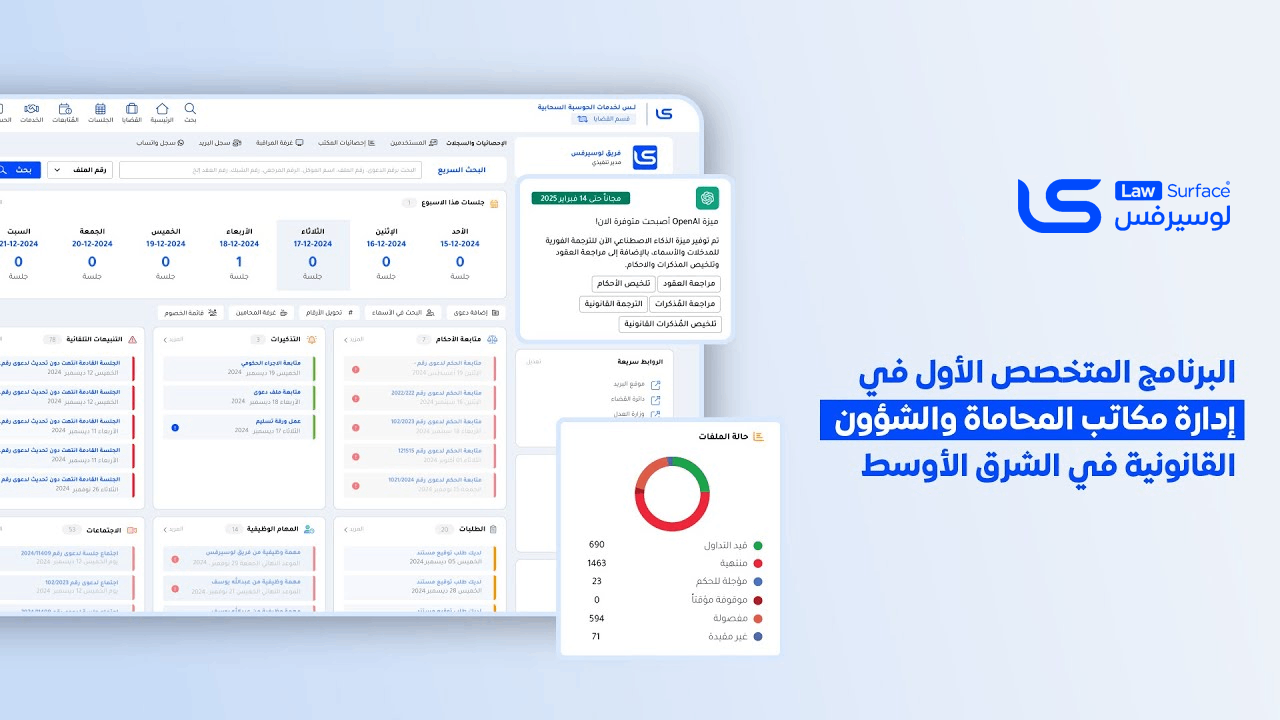What is a law firm management system?
It’s a specialized software used to organize and manage daily operations in law firms, such as managing legal files, scheduling appointments, following up on cases, recording invoices and expenses, and analyzing financial performance. This system helps lawyers streamline their operations and achieve the highest levels of efficiency and accuracy in handling data and information, contributing to improved quality of services provided to clients.
What are the advantages of a law firm management system?
A law firm management system is a comprehensive tool that contributes to improving the effectiveness of case and financial management, reducing human error, and enhancing the organization of legal data, making office operations smoother and more accurate. The following points highlight the most prominent features of a law firm management system:
File management and document organization:
The system enables the digital storage and organization of legal files and documents, facilitating quick and accurate access to information and reducing the likelihood of document loss or the need for paper storage space.
Invoice recording and expense management:
The system enables clients to invoice and record case-related expenses, while also tracking revenues and expenses and analyzing financial performance, facilitating the management of a law firm’s financial aspects.
Internal communication capability:
Law firm management software provides an effective communication platform for team members within the firm, allowing them to exchange notes and ideas on cases and share them in real time, enhancing coordination and collaboration across the legal team.
Track case progress and appointments:
A law firm management system helps track case progress and manage appointments and related events, with the ability to schedule appointments and alert lawyers when important dates or court hearings are approaching.
Ensuring security and confidentiality:
The system includes advanced security features to ensure the protection of legal information and the confidentiality of files, as the confidentiality of legal data is of paramount importance in legal work.
Data Analysis and Reporting:
A law firm management system provides data analysis and reporting tools related to cases, attorney performance, and budgets, helping the firm make decisions based on accurate and up-to-date information.
Save time and increase productivity:
By automating many manual processes and streamlining workflows, this system allows lawyers to focus their efforts on the legal aspect, increasing work efficiency and productivity.
You may also be interested in: Digital Transformation for Law Firms: Why is Law Firm Software an Indispensable Tool
Criteria for selecting the best management system for a law firm
When choosing a law firm management software, there are a number of key criteria to consider to ensure the system is tailored to the firm’s needs and maximizes its benefits. Here are the most important of these criteria:
Ease of use:
The system should be simple and easy to use, enabling lawyers and office staff to operate without extensive training. This requires a user-friendly interface that is straightforward to navigate.
Security and confidentiality:
Given the sensitivity of legal data, the system must have high levels of security, including data encryption and user permission management, ensuring the protection of legal information and customer privacy.
Compatibility with office needs:
It’s important to choose a law firm management system that matches your firm’s size and needs, providing the right tools for case management and facilitating collaboration among team members. So, determine your firm’s exact needs and then find a system that meets them.
You may also be interested in: 7 Benefits of Law Firm Management Software to Increase Efficiency and Reduce Effort
Integration with other systems:
Your law firm may need to integrate the system with other software or tools. Ensure that the chosen system allows for seamless integration, thereby improving workflow and reducing the time wasted switching between programs. This is a key consideration when selecting a new law firm management software.
Flexibility and customization:
The chosen law firm management system or software should be customizable, allowing the firm to adjust its settings and features to suit its specific workflow. This flexibility helps make the system more effective and responsive to changing business needs.
Technical support and training:
It’s essential to ensure that the chosen law firm’s management system provides efficient and prompt technical support, as well as training options for employees on how to use the system. This helps resolve technical issues quickly and avoids disruption to workflow.
Reporting and data analysis:
Another important consideration when choosing the right law firm management software is the availability of reporting and data analysis features. This feature provides a clear view of the firm’s performance, attorney productivity, and the status of financial cases, helping you make data-driven strategic decisions.
By choosing a management system based on these standards, a law firm can leverage technology to improve workflow, reduce errors, and enhance performance, contributing to the firm’s long-term success. Lucervs’ law firm management software provides you with all the tools you need to enhance your firm’s business management and better focus on providing the best legal services to clients.






